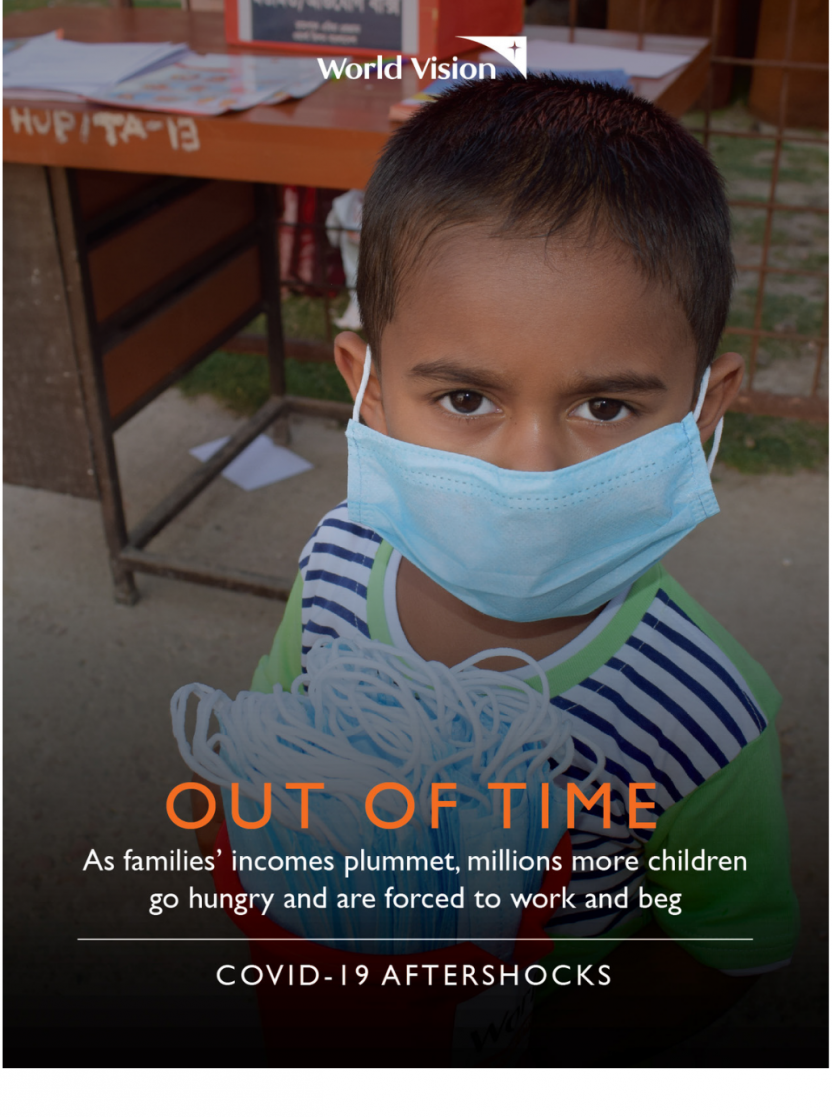
COVID-19: new surveys show poverty crisis in Asia
By Ellie Wong, Carolyn Kabore and Angeline Munzara
10 July 2020
Findings from World Vision’s Out of Time report reinforce predictions of an emerging global poverty and food insecurity crisis. According to the United Nations, COVID-19 could push a further 34 million people into extreme poverty by 2020 and an additional 130 million people by 2030.
Global health journal The Lancet predicts – in the most severe scenario – reduced access to nutritious food could lead to wasting increasing by 50% over six months, causing an additional 1.15 million child deaths. The World Food Programme has warned that the number of people requiring lifesaving food assistance could double to 265 million people worldwide.
Uneven social protection coverage is a key challenge. 55% of the global population do not have social protection, especially in developing countries and fragile contexts. Almost two-thirds of all children – over 1.3 billion girls and boys – have no access to social protection.
World Vision data from rapid assessments in 14,000 households in nine countries in the Asia-Pacific reinforce these global predictions. Data was collected from India, Bangladesh, Nepal, Sri Lanka, Philippines, Indonesia, Myanmar, Cambodia and Mongolia.
Our findings highlight that while COVID-19 began as a health crisis, currently the most serious effects are increased food insecurity and poverty for vulnerable children and their families impacted by the pandemic. As families are struggling to cope with loss of income and livelihoods, meeting basic household needs is a growing challenge.
 Source: Rapid assessments in 14,000 households in World Vision programs in Asia
Source: Rapid assessments in 14,000 households in World Vision programs in Asia
The assessment found that over two-thirds of the respondents said their livelihoods were fully or severely affected. Approximately one-quarter did not have any food on hand, with one-third only having one week’s supply. As families grappled with loss of livelihoods and income, common coping mechanisms included borrowing from friends or neighbours (39%), reducing the quantity and quality of meals (30%) and using cash savings on hand (32%).
 Source: Rapid assessments in 14,000 households in World Vision programs in Asia
Source: Rapid assessments in 14,000 households in World Vision programs in Asia
Given disrupted household incomes, children are being impacted in different ways. In addition to increased risks of food insecurity and malnutrition, there are also child protection risks. Some families had sent their children to family and relatives (6%) or institutions (2%). However, 6% said they had sent children to work and 8% had sent children to beg or do other risky activities. In some circumstances, there had even been cases of child marriage (1%).
The patterns of response in these assessment data are alarming and could reflect the situation faced by many households in the countries surveyed. World Vision estimates that up to 85 million households across Asia may have no or limited food stocks, up to 110 million children may be going hungry, and up to 8 million children may have been pushed into child labour and begging. While the data has various limitations, and every country’s evolving situation is different, these findings signal increased risks for vulnerable families and their children across the region.
Other recent World Vision and Vision Fund rapid assessments in Sub-Saharan Africa and Latin America outlined in our report have had similar findings on the impact of loss of income and livelihoods on vulnerable families and their children. Around the world, what is clear is that the pandemic has exacerbated further inequalities faced by those families and communities impacted by poverty, fragility, conflict, climate change and other disaster risks.
Looking ahead, the current crisis forces us to make critical decisions on what our collective future looks like. We must urgently protect development gains in poverty reduction and food security. In the longer term, returning to ‘business-as-usual’ cannot be an option. Instead, the global community must act decisively and with resolve to build back a better ‘new normal’ centred around inclusion and resilience.
World Vision calls on governments, UN agencies, donors, NGOs and the private sector to act together to:
- Urgently scale up child and gender sensitive social protection measures to help vulnerable families meet immediate food and income needs now. Cash and voucher assistance are playing an important role in supporting these families.
- Keep food and market systems going. It is critical to prioritise rapid analysis, response and adaptations to food and agricultural markets. Policies should support the continued global, national, regional and local trade of essential commodities.
- Protect jobs and livelihoods of vulnerable groups. Smallholders, agricultural workers, rural households, and micro, small and medium enterprises need support to access finance and continue productive activities.
- Build back better more inclusive, resilient and greener economies by investing in economic recovery centred around pro-poor, Women’s Economic Empowerment and climate-smart outcomes. Inclusive market systems development approaches that promote market systems change that include poor and marginalised groups, while also strengthening productive capacity of these groups, are key.
- Invest in interventions promoting a green recovery. Develop economic recovery interventions that integrate resilience to climate change and restore environmental assets central to food security, safety nets and natural resource-based livelihoods.
Read World Vision’s full Out of Time report here.
The post is part of the #COVID-19 and Asia series.
About the author/s
Ellie Wong
Ellie Wong is the Senior Advisor on Women’s Economic Empowerment at World Vision Australia’s Social Entrepreneurship and Economic Development (SEED) team.
Carolyn Kabore
Dr Carolyn Kabore is the Senior Advisor for Design Monitoring Evaluation & Research for Livelihoods at World Vision International.
Angeline Munzara
Angeline Munzara is the Livelihoods Senior External Engagement Advisor and Savings for Transformation project model manager for World Vision International.
